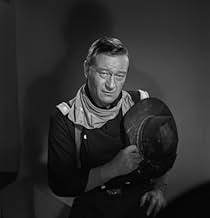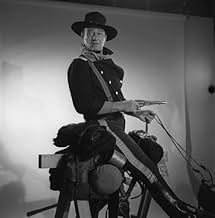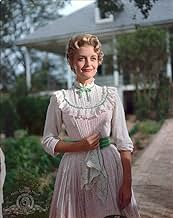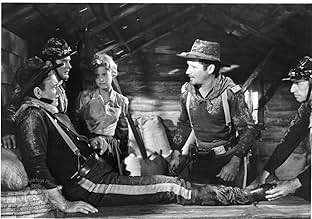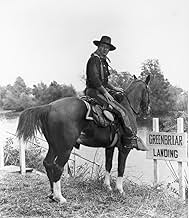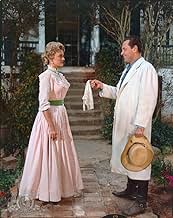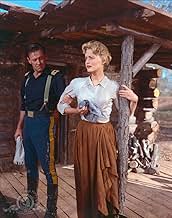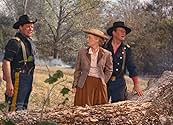Adicionar um enredo no seu idiomaIn 1863, a Union outfit is sent behind Confederate lines in Mississippi to destroy enemy railroads but a captive southern belle and the unit's doctor cause frictions within ranks.In 1863, a Union outfit is sent behind Confederate lines in Mississippi to destroy enemy railroads but a captive southern belle and the unit's doctor cause frictions within ranks.In 1863, a Union outfit is sent behind Confederate lines in Mississippi to destroy enemy railroads but a captive southern belle and the unit's doctor cause frictions within ranks.
- Direção
- Roteiristas
- Artistas
- Prêmios
- 1 indicação no total
- Direção
- Roteiristas
- Elenco e equipe completos
- Produção, bilheteria e muito mais no IMDbPro
Avaliações em destaque
Colonel John Marlowe (John Wayne) is ordered by the Union generals to lead his army 300 miles into the Confederacy, where they are to sabotage and disrupt the vital railway supply town of Newton Station as much as possible. After a disastrous few months of lost battles and heavy casualties, the Union generals are determined to swing the battle back in their favour before the arrival of winter. Marlowe is unhappy to learn that his orders include allowing army surgeon Major Kendall (William Holden) along on the mission. Since the death of his wife at the hands of two blundering surgeons, Marlowe has had little respect for those in the medical profession. To further complicate matters, a feisty Southern belle, Hannah Hunter (Constance Towers) with Confederate sympathies, overhears Marlowe informing his men that Newton Station is the target, and that once the town has been raided the Union forces plan to head for the safety of Baton Rouge. In order to secure her silence, Marlowe has to take her prisoner and suffer her sharp Southern tongue (plus escape attempts) during the trip.
The Horse Soldiers is filmed in loving detail, with gorgeous autumnal backdrops. Its story is very interesting, especially the volatile relationship between Wayne and Holden, and the mission itself provides excitements along the way. In particular, a street battle at Newton Station is memorable, as is a scene later in the film when the Union soldiers come under attack from an army of Confederate army cadets still at schoolboy age. Towers' character is written as a very cunning and feisty woman, who disguises her attributes by coming across as a melodramatic, gossipy airhead. Towers plays the part well, but because of how she's encouraged to handle the role she becomes rather irritating too. One disappointing moment in the film comes when Wayne and Holden reach breaking-point with each other and ride off to a secluded glade to slug it out. The sequence is set to be a real humdinger, but is curiously cut short by the arrival of the enemy forces. On the whole, though, The Horse Soldiers is a good, solid Civil War entertainment, well worth a look.
John Ford always disparaged the films he made after Wings of Eagles, but in my opinion, The Horse Soldiers is one of his finest films. Also in my humble opinion he managed to get one of John Wayne's finest film performances. Wayne's a volunteer officer, in civilian life he rose from section hand on a railroad to an construction engineer. Holden calls him "section hand" as a term of derision after Wayne consistently refers to him as "croker."
Wayne and Holden were very close personal friends and friendly rivals at the box office. That's part of the reason that The Horse Soldiers is so good, the chemistry between them. In fact when Wayne died in 1979, Holden was said to have gone on one legendary drinking binge. Who would have suspected we'd have lost him as well two years later.
Holden as the doctor has a less flamboyant part than Wayne, but he makes the most of what he was given. I suspect knowing the relationship between Wayne and John Ford, he knew going in his part would be less, but he did it anyway.
Anyone who thinks John Wayne incapable of acting should see the scene in the saloon at Newton's Station after the Union forces repel a Confederate attack and are about their business destroying the railroad property. In a great drunk scene he reveals to Constance Towers the reason for his hatred of the medical profession. I won't reveal it, but it's something we can all understand. Wayne did this scene so well that Ford used an abbreviated version of it in The Man Who Shot Liberty Valance.
Ford makes marvelous use of music in there, weaving traditional Civil War era songs with the song written by Stan Jones for the film, I Left My Love. That is one catchy and infectious ballad, one of the best things written for a John Ford movie. Incidentally Stan Jones makes a brief appearance in the film as Ulysses S. Grant and does well by him.
There are two in the supporting cast that deserve mention. During the Civil War Lincoln had to deal with volunteer political generals, most of whom were a flop. Willis Bouchey playing John Wayne's co-commander in the expedition captures the phenomenon to perfection. He's argumentative, arrogant, and a general pain in the butt to Wayne. It's probably Bouchey's finest screen performance.
And Carleton Young also gives what I think is his finest screen performance as the one armed Confederate colonel who tries in vain to stop Wayne from completing his plans. It's a role that requires dignity and strength and Carleton Young is marvelous. In fact the contrast between Bouchey and Young as soldiers is pretty obvious.
The relationship between the Section Hand and The Croker evolves during the running time of The Horse Soldiers. It's a relationship well worth seeing develop.
Historical inaccuracy aside though the movie did quite well. The film showed multiple viewpoints and a fair degree of respect for most of them. It showed aspects of the war that were generally ignored in other films of the period -- the bloody horror of battlefield amputations, the desire of people to give up on the whole thing (I can't think of an earlier film that talked about deserters and the way they disrupted the southern home front), and the pain of the sheer physical destruction of the war -- a pain that affected the destroyers as well as the victims, something Gone With the Wind never quite admitted.
Some posters have complained about southern belle Hannah Hunter's overuse of sex appeal to spy on Union soldiers -- while there was no historical Hannah Hunter there were plenty of southern women who did just that, including Belle Boyd, Rose Greenhow and others. Some posters have complained about the way the film trivializes slavery -- this is unfair. It underplays slavery but never trivializes it. It shows conflicts within the Union army about the institution and addresses the issue of personal loyalty between some slaves and masters without glamorizing the institution as a whole. Does the film go far enough by modern standards? No. But it goes much farther than its contemporary and treats the slavery issue more honestly than modern travesties like Gods And Generals.
One poster actually complained about how inaccurate southern snipers were -- this is completely unfair. There was no indication that the "snipers" were specially trained men with Whitworth rifles or anything like that. They looked more like ordinary troopers out skirmishing, or perhaps the even more poorly trained militia. Ordinary soldiers fired more than 100 rounds for every hit they scored, so poor shooting on either side is nothing to be surprised about.
8 out of 10
It's the sort of Ford film that must have been hard on the actors, riding through swamps on horseback and engaging in fierce battles when pursued by Rebel forces. William Holden has some wonderful moments as a doctor who is constantly bickering with John Wayne. Their exchanges provide plenty of tension and humor--and both actors are at their best under Ford's direction.
A good Civil War western combining magnificent photography, good performances and some rousing battle scenes. The horrors of war are not ignored and there are some sentimental moments that never strike a false note.
Você sabia?
- CuriosidadesThe film marked the beginning of mega-deals for Hollywood stars. John Wayne and William Holden received $775,000 each, plus 20% of the overall profits, an unheard-of sum for that time. The final contract involved six companies and numbered twice the pages of the movie's script. The film, however, was a financial failure, with no profits to be shared in the end.
- Erros de gravaçãoIn the shot right after Hank Worden throws the torch onto the cotton bales, look at the upper left of the screen. You will see an airplane flying from right to left.
- Citações
Miss Hannah Hunter: [bending over with a plate of chicken, revealing ample cleavage] Do you prefer the leg... or the breast?
Col. John Marlowe: I've had quite enough of both, thank you.
- ConexõesFeatured in Dirigido por John Ford (1971)
- Trilhas sonorasI Left My Love
by Stan Jones
Principais escolhas
- How long is The Horse Soldiers?Fornecido pela Alexa
Detalhes
- Data de lançamento
- País de origem
- Idioma
- Também conhecido como
- Marcha de valientes
- Locações de filme
- Empresas de produção
- Consulte mais créditos da empresa na IMDbPro
Bilheteria
- Faturamento bruto nos EUA e Canadá
- US$ 1.753.526
- Tempo de duração2 horas
Contribua para esta página



